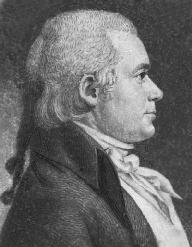Caesar Rodney was a delegate from Delaware who served in the First and Second Continental Congress. Rodney also served as a militia commander in the American Revolutionary War.

He was ill during the vote for independence and was sent to cast a vote due to fellow delegate George Read voting against independence. He served alongside fellow Delaware delegates Thomas McKean and George Read.
Early Life and Career of Caesar Rodney
Caesar Rodney was born to a prominent Delaware family that owned a large and prosperous farm.
The family farm, Byfield, was an 800-acre farm with many slaves. Caesar lived here until his father's untimely death when he was sixteen years of age. After his father's death, he was orphaned and was raised by Nicholas Ridgely.
The sixteen-year-old Rodney was known for his wit and excellent political skills.
He rose to prominence in Delaware and served in the militia during the French and Indian War.
After the war, he served as an Associate Justice of the Supreme Court.
In 1755, Rodney was elected Sheriff of Kent County and served for three years. During his tenure, he acquired much wealth.
He went on to serve in multiple positions within the government and emerged as a leader of the "country" party in Delaware and worked alongside fellow signer Thomas McKean.
In 1765, a group of delegates that were against the Stamp Act organized a Committee of Correspondence to communicate with each other and discuss relevant topics.
This Committee led to the Stamp Act Congress and Continental Congress. Rodney served as a delegate for Delaware in each of these congresses.
He and fellow delegate Thomas McKean led in the debate to call for Delaware to separate itself from Great Britain. In 1776, when George Read surprised all the delegates in the Continental Congress by voting against the Declaration of Independence, Rodney rode a horse from Delaware to Philadelphia in the middle of a terrible thunderstorm. He arrived in time to cast a vote in favor of independence and break the deadlock.
American Revolutionary War
Throughout the American Revolutionary War, Caesar Rodney served as Brigadier General of Delaware's militia.
He was one of the few delegates to the Continental Congress that had earlier military experience. During the Revolution, Rodney was promoted to Major-General of the Delaware militia by George Washington.
Here, he served until the Battle of Brandywine, which resulted in the State President of Delaware, John McKinly, being captured by the British and George Read relieving himself of duties to poor health and exhaustion.
These events placed Caesar Rodney and Thomas McKean back into the Continental Congress.
Rodney replaced McKinly as President of Delaware and reignited Delaware's passion for the revolution.
His natural charisma allowed him to influence much of Delaware's politics, and his relentless devotion to the cause changed Delaware's political landscape.
Rodney began enforcing his authority and confiscating loyalist property and began scouring Delaware for supplies to help the Continental Army. The men of Delaware went on to fight bravely and distinguish themselves in the Battle of Monmouth but, was nearly destroyed when Gates fled the field at the Battle of Camden.
By the end of 1781, Rodney had stabilized Delaware. The coast still had to deal with loyalist privateers, but incidents were lower than it had been before.
His health began to take a serious decline, and he was forced into resignation shortly after the siege of Yorktown.
Final Years and Death
Caesar Rodney returned home after serving his country throughout the American Revolutionary War.
He was elected to the United States Congress under the Articles of Confederation in 1782 and 1783 but could not attend due to his poor health. Rodney had suffered from cancer for many years, and is now spread over his face.
His life was terminated in 1784. Charles Goodrich, who wrote the Lives of the signers of the Declaration of Independence, said:
It would be unnecessary, were it in our power, to add anything further on the character of Mr. Rodney. He was, as our biographical notice clearly indicates, a man of great integrity and of pure patriotic feeling. He delighted, when necessary, to sacrifice his private interests for the public good. He was remarkably distinguished for a degree of good humor and vivacity and, in generosity of character, was an ornament to human nature.
